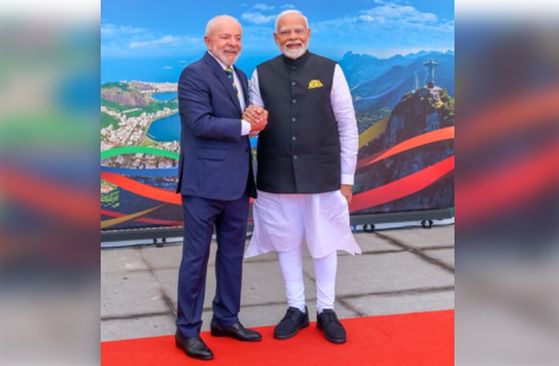"Looking forward to the proceedings at the G20 Summit in Rio de Janeiro. Thankful to President Lula for the warm welcome," PM Modi posted on X after exchanging greetings with the Brazilian President.
As he entered the venue, PM Modi also met several world leaders, including US President Joe Biden, French President Emmanuel Macron, Singapore Prime Minister Lawrence Wong, UN Secretary General António Guterres and the World Bank President Ajay Banga.
Besides the leaders of the 19 member countries and the European Union, the Summit is witnessing participation of the African Union for the first time after getting inducted as a full member of the grouping during the New Delhi G20 Summit, last year.
Brazil has also invited 18 guest countries, five each from Africa, Latin America and Asia; and three countries from Europe. There are also 15 international organisations that are attending the Rio Summit.
"The G20 has emerged as the primary forum for international economic cooperation and on issues of global significance. It provides an opportunity for leaders of the 21 largest economies in the world, representing about 88% of global GDP, 78% of international trade and nearly three quarters of the world's population, to come together and discuss key issues impacting the world such as progress on Sustainable Development Goals, multilateral reforms, tackling environmental and climate challenges, debt sustainability, bridging the global digital divide, the energy transition and emerging technologies," said Foreign Secretary Vikram Misri before PM's departure, last week.
'Building a Just World and a Sustainable Planet' has been Brazil's G20 theme with three key priorities, including social inclusion and the fight against hunger and poverty, energy transitions and the promotion of sustainable development in its economic, social and environmental dimensions and reform of global governance institutions.
The flagship deliverable of the Brazilian Presidency is the Global Alliance Against Hunger and Poverty, which will be launched during the Inaugural Session of the Rio Summit. This will be an initiative that is open to non-G20 countries as well, as also national, regional and international organisations, regional and multilateral development banks, civil society organizations and philanthropic institutions. There are three pillars under this Alliance and India will be joining the national and knowledge pillars of this Alliance.
The main sessions will be followed by a closing ceremony where the Presidency of the G20 will be handed over by President Lula of Brazil to South Africa President Cyril Ramaphosa, capping a run of four Emerging Markets and Developing Economy (EMDE) countries, holding the Presidency in succession of the G20, starting with Indonesia, India, Brazil and South Africa, next year.
Misri has emphasised that the Rio Summit remains significant for India in particular as it looks at continuity of priorities from the New Delhi Summit, where a number of issues of interest, especially to emerging markets and developing economies were discussed.
"Last year at the G20, as you would recall, we had come out with the G20 Deccan High Level Principles on Food Security and Nutrition which align with the main priority of the Brazilian Presidency this year. ‘Reform of multilateral institutions fit for the 21st century’ was another key priority of our Presidency and this is again being taken forward by Brazil this year. And the G20 leaders called for better, bigger and more effective multilateral development banks during the New Delhi Summit, found resonance globally and is being carried forward this year through the G20 roadmap for better, bigger and more effective MDBs and this is a roadmap that will be endorsed by the leaders at the Rio Summit," the Foreign Secretary had mentioned during a briefing before PM Modi's three-nation tour.
This is Prime Minister Modi's third official visit to Brazil, having travelled to the country in 2014 and 2019, also for the BRICS Summits.
--IANS
Read More International News















